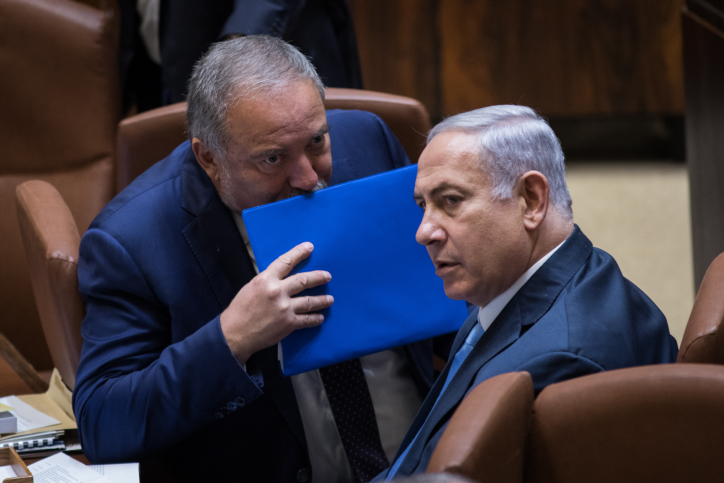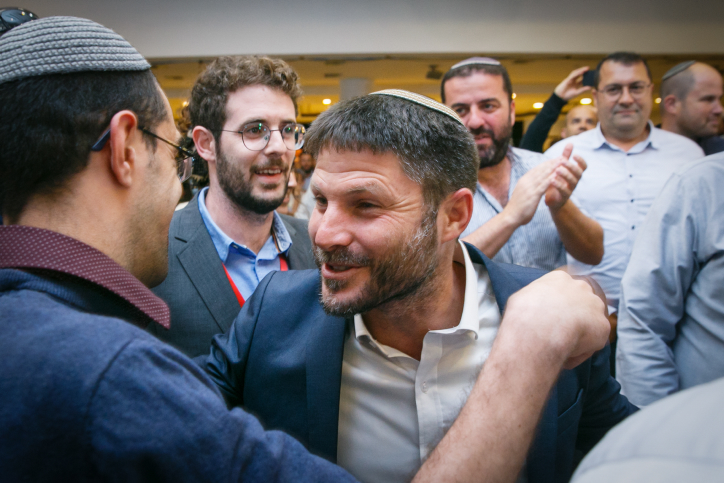Snap elections just weeks after Israelis went the polls are the result of a rivalry between Liberman and Netanyahu, but that’s just part of the story. The right is immersed in a crisis of identity, leadership, and politics.
By Meron Rapoport

What happened to Avigdor Liberman? Why did he insist on cutting short what will become the shortest Knesset term in Israeli history? Was it his deep personal hatred for Netanyahu or was he simply settling a score? Was it an opportunity to build himself up politically before disappearing alongside his small, sectorial party?
Amid all the questions remains a point that has gone largely undiscussed: Liberman’s success at thwarting Netanyahu reflects a deep crisis among the Israeli right. It is a complex crisis that can be broken down into three parts: the divide between ultra-Orthodox and secular right-wingers; a crisis of leadership; and a political crisis regarding the future vis-a-vis the Palestinians.
Building a secular right-wing bloc
Let’s begin with the confrontation between Liberman and the ultra-Orthodox parties. Liberman has accused the prime minister of “giving in to the Haredim,” particularly on the issue of exempting ultra-Orthodox men from mandatory military conscription. On its face, it is difficult to understand why Liberman would care so much about ultra-Orthodox service in the army; he himself has sat alongside and at times allied himself with the ultra-Orthodox parties. So what has changed?
The answer lies in the results of the last elections. The two ultra-Orthodox parties, Shas and United Torah Judaism, increased their electoral strength to 16 Knesset seats. Their power inside the right-wing bloc grew from one-fifth in the previous Knesset (13 out of 67 seats) to nearly a quarter (16 out of 65 seats). But this is only part of how the right is becoming more religious.

In the last Knesset, Naftali Bennett’s Jewish Home party was seen as relatively moderate when it came to religious issues. But the differences between the religious moderates and the ultra-Orthodox parties have narrowed: from the treatment of the LGTBQ community to growing calls for gender segregation inside the IDF. The six seats won by the Union of Right-Wing Parties last elections means that 22 Knesset seats — one-third of the right-wing bloc — belong to religious parties.
Meanwhile, Liberman’s Yisrael Beiteinu is a sectorial party made up of mostly Israelis from the former Soviet Union. Most of its voters are older, secular, and in agreement with Liberman’s anti-Orthodox policies. Their worldview is far from that of the far-right religious parties and the ultra-Orthodox.
The official Israeli rabbinate largely views Israelis from the FSU as non-Jews, which has a direct consequence on their ability to get married or buried in Israel, the right to eat non-Kosher food, and even get around on Saturdays. The tipping of the scales of power toward the ultra-Orthodox and the far-right national-religious parties could be viewed as a direct threat Israelis from the FSU and the personal attacks on Liberman these last few days may only deepen this rift.
That neither Bennett and Ayelet Shaked’s New Right party nor Moshe Feiglin’s Zehut party — both of which offered an ostensibly secular version of right-wing Jewish nationalism — did not pass the election threshold opened the door for a secular right-wing party, and perhaps even a secular right-wing bloc, which Liberman hopes to lead.
The fall of King Bibi
The right is in the throes of a major crisis of leadership. Aside from a small reprieve during the time of Ariel Sharon, Netanyahu has been the Israeli right’s unrivaled leader. Over the past decade, after winning four straight elections, the prime minister has come to be seen as a kind of magician, touched by the hand of god. He is not only the right’s figurehead — he is its top ideologue.
In an interview with The Marker, Dr. Gail Talshir showed how Netanyahu largely abandoned his Thatcherite economic policies following his defeat in the 2006 elections, which was widely attributed to the heavy cuts to the welfare state he implemented as finance minister. Instead, he adopted a discourse of “Jew versus Israeli.” The Jewish Nation-State Law is the continuation of this ideological process, which has succeeded in bringing into his tent national-religious voters, “traditional” Mizrahi voters (who vote mostly for the Likud), the secular right (historically part of Likud), the ultra-Orthodox in all their variations, and immigrants from the Former Soviet Union.

The indictments waiting for Netanyahu undermine his status the unquestioned leader of the right and have him in a tight spot. Many understand this. Gideon Sa’ar, his rival in Likud, certainly understands it and is building himself up for the day after Netanyahu falls. The same goes for Transportation Minister Yisrael Katz and Public Security Minister Gilad Erdan. Liberman, too, is aware. Sa’ar and other ministers from Likud cannot publicly turn against him while he’s still in charge but Liberman has nothing to fear and can therefore hasten the process.
Liberman knows something else as well: immigrants from the Soviet Union are not necessarily committed to many of the religious aspects of Judaism. They have no special commitment to the Land of Israel like the national-religious do, and thus Liberman believes they will follow him wherever he goes.
He’s not alone in trying to exploit Netanyahu’s weakness. Union of Right-Wing Parties MK Bezalel Smotrich’s demands in coalition talks were far more excessive than Liberman: nothing short of a legal and political revolution — an override bill that would defang the High Court’s ability to exercise judicial review and the partial or full-blown annexation of the West Bank — in addition to the appointment of party members to head the education and justice ministries. Smotrich also knew that Netanyahu’s wiggle room was limited, that he could not walk away and form a centrist government like he did with Tzipi Livni in 2009. Indeed, Netanyahu gave in to their demands. The override bill was never his idea; he even told Labor leader Avi Gabbay that he would forgo it should the latter join his coalition.
But Liberman went even further. Not only did he want to precipitate Netanyahu’s downfall — he wanted to be the one to dethrone the prime minister and to crown his successor, which he believes will lead a Likud-Gantz-Liberman government. Liberman knows that Netanyahu could not afford to pass a law conscripting ultra-Orthodox men without the ultra-Orthodox parties reneging on their promise to protect him from prosecution.
The right can’t make the Palestinians disappear
The right faces one more internal weakness. Over the past decade, Netanyahu has sanctified the status quo vis-à-vis the Palestinians. But the status quo is a fallacy — there is no vacuum and the Palestinians aren’t going anywhere. Even when the world’s attention is elsewhere, even when the U.S. president threatens to cut aid to the Palestinians, even when Saudi Arabia and the Emirates embrace Israel, the Palestinians remain.
Now it appears that a growing segment of the right is losing patience. The leadership of the Union of Right-Wing Parties is demanding immediate annexation and has been able to move large parts of Likud toward its vision. Liberman wants to crush Hamas, but both he and Smotrich know these are all empty words. There is no real political will for annexation and there is certainly no desire to send in troops and re-establish military control over Gaza.

This is evident from the attitude toward Trump’s “Deal of the Century,” which will inevitably be postponed until a new Israeli government is formed (and may never actually be published). It was supposed to fit the Israeli right like a glove, yet many are now worried. They know that neither David Friedman, Jared Kushner, or even Trump himself can make the Palestinians disappear. The Palestinian decision to boycott the U.S.-led “economic workshop” in Bahrain is another example of the White House’s powerlessness, even as Saudi Arabia and the Gulf states stand by its side.
The gap between desire and reality is frustrating, especially considering that the right has been in control for more than a decade and enjoys a majority in the Knesset, the government, and among voters. Smotrich is taking out his frustrations on the judicial system, and thus fraying relations between Netanyahu and Israel’s elites. Liberman is taking out his frustration on the ultra-Orthodox and putting Netanyahu’s relationship with his allies to the test. Both of them reflect a loss of direction for the Israeli right. The right knows how to get into power, it has a majority of the Israeli public behind it — it just doesn’t know what to do with it.
Meron Rapoport is an editor at Local Call, where this article first appeared in Hebrew. Read it here.
